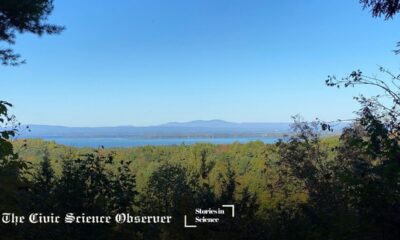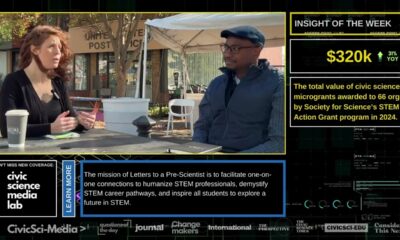Stories in Science Special Series
Discovering My Passion for Teaching
Jennifer Gatti – “My message to my students is simple: don’t be afraid to try new things and don’t get stuck doing something simply because you think it is what you are supposed to do. You never know where you might discover the thing you truly love to do.”

Jennifer Gatti
[su_boxbox title=”About”]Dr. Gatti is a Science Teacher at Buckingham Browne & Nichols School. Explore her LinkedIn profile to learn more.[/su_boxbox]
[dropcap]T[/dropcap]hroughout my life, the message has always been clear: find your passion and love what you do because if you don’t, you might dread getting out of bed every day. I’m happy to say that I absolutely LOVE what I do every day. Although it took me a long time to figure out exactly what I was meant to do (and many years of my mother asking me when I was going to get a “real” job), I wouldn’t trade any of the experiences I have been lucky enough to have.
Growing up, I was convinced I was meant to be a doctor. My father and grandfather were doctors and my grandmother was a nurse; I was born to be a physician. I loved hearing about challenging cases at the dinner table and relished any opportunity to visit the hospital with my dad. At Wellesley College, I majored in biology and took all of the required pre-med courses. I joined all of the student interest groups that promised tips to help me get into med school. However, as college progressed, I found that I loved other aspects of biology too. I was fascinated by evolution, marine biology and environmental science. I struggled because I wasn’t sure what else I could do with my life if I didn’t go to medical school. Upon my return from my semester abroad in Australia, I was offered a research project that would become my senior thesis. This opened my eyes to entirely new possibilities.

Dr. Jennifer Gatti
As I worked in the lab studying the olfactory system of decapod crustaceans, I realized that while I loved to learn about human physiology and health, I was more interested in understanding the mechanism of disease than I was in treating patients. My faculty advisor broached the idea of pursuing a Ph.D., which I had never thought of. I realized it offered exactly what I was looking for; the opportunity to learn the underlying biology of everything I had been fascinated with.
As I approached graduation and the deadline for applying to graduate programs, I couldn’t decide which area of biology I wanted to study. Marine Biology? Physiology? Neuroscience? I decided to take a year off before applying to figure it out. So I applied for a position which included both teaching and working in the admissions office at a small boarding school in Pennsylvania. Little did I know how much of an impact this year would have on my life!
In the first year, I fell in love with teaching, but I was torn between this new passion I had discovered and the path to graduate school that I had committed myself to the year before. I decided to spend a bit more time exploring the world of education before making a decision. While I knew how biology worked, I didn’t have a clue what pedagogy was, how to design curriculum, or how to work with students at different ability levels. Following my gap year, I earned a master’s degree in secondary science education. I relished the discussions about how students learn and practiced teaching techniques other than the lecture style I was used to. I spent three more years teaching high school before realizing that I still wanted the satisfaction of conducting my own research, so I went back to school for my Ph.D. and then a postdoc.
I love the moment a student finally gets a tricky concept, even when I am frustrated from having to explain it over and over.
Once I started my Ph.D., everyone I encountered who knew that I liked teaching encouraged me to become a professor at a liberal arts college. Why would I get a Ph.D. if I was just going to go back and teach high school? I would be overqualified and my graduate degree would be wasted. I snatched up every teaching opportunity I could find. I was a TA for undergraduate, graduate courses, and medical school courses. I was an adjunct at a local women’s college and I was (and still am) a lab instructor at Harvard Extension School.
As I neared the end of my postdoc, I applied for positions at small colleges that would let me spend a significant amount of time both teaching and doing research. My job search lasted two years, during which I interviewed at a variety of schools with the hope of finding an institution that would feel like the right fit. After every interview, I would recount the experience to my lab mates. Each time I found myself saying, “it’s a great school, but….” I never found a place where I felt the rush of knowing that I had found my dream job. I began to doubt my scientific ability, and myself, but remained convinced that these positions were what I should strive for after almost 11 years of training.
In the second year of my job search I had the opportunity to interview at a prestigious women’s college, my dream job, or so I thought. The interview went well, but I was the second choice for the position. My friends and loved ones expressed words of encouragement, assuming that I was disappointed. Although it definitely stung not to win first place, my primary feeling was a sense of relief that I didn’t get the job and have to decide whether or not to accept it. As I spent the next few weeks of soul searching, I realized that while I enjoyed research and the opportunity to discover new things, I wanted to be in the classroom and didn’t need to have my own lab. I also wanted to work with younger students, those in the early stages of discovering who they are and what they like to do. As I came to this realization, I was petrified. What if I was making the biggest mistake of my life? I knew that I would never really be able to go back if I walked away from the bench and academia. As scary as it was to take the leap, I have not regretted one minute of the last three years.
My message to my students is simple: don’t be afraid to try new things and don’t get stuck doing something simply because you think it is what you are supposed to do. You never know where you might discover the thing you truly love to do.
It took me a long time to realize that teaching high school is what I am meant to do. I spend my days teaching science at a private school (Buckingham Browne & Nichols School) in Cambridge, MA. Much of my time is spent teaching biology and advising 9th graders, which can be fun, exhilarating, and incredibly frustrating all at the same time. But as my parents instructed me, now quite a few decades ago, I have found what I love to do, which keeps it from being work. I love the moment a student finally gets a tricky concept, even when I am frustrated from having to explain it over and over.
I love interacting with students who claim that they hate science and aren’t good at it, convinced that I am there to simply torture them. I enjoy the moment when they admit that, “it isn’t as hard as I thought it would be.” I can still “do science,” through my exploration of teaching and learning techniques. I try to utilize project-based curriculum and independent research projects to give my students the experience of creating their own discoveries.
I stay on top of papers published in my field – nervous system development and synapse formation – and I try to attend as many local seminars as I can. I stay in touch with friends who are in industry and academia, often introducing them to my students to expose them to myriad career opportunities that are out there. My message to my students is simple: don’t be afraid to try new things and don’t get stuck doing something simply because you think it is what you are supposed to do. You never know where you might discover the thing you truly love to do.
Metrics
Sessions
Total number of Sessions. A session is the period time a user is actively engaged with the page.
Visitors
Users that have had at least one session within the selected date range. Includes both new and returning users.
Page views
Pageviews is the total number of time the article was viewed. Repeated views are counted.
The CS Media Lab is a Boston-anchored civic science news collective with local, national and global coverage on TV, digital print, and radio through CivicSciTV, CivicSciTimes, and CivicSciRadio. Programs include Questions of the Day, Changemakers, QuickTake, Consider This Next, Stories in Science, Sai Resident Collective and more.

-
 Audio Studio1 month ago
Audio Studio1 month ago“Reading it opened up a whole new world.” Kim Steele on building her company ‘Documentaries Don’t Work’
-
Civic Science Observer1 week ago
‘Science policy’ Google searches spiked in 2025. What does that mean?
-
Civic Science Observer1 month ago
Our developing civic science photojournalism experiment: Photos from 2025
-
Civic Science Observer1 month ago
Together again: Day 1 of the 2025 ASTC conference in black and white
Contact
Menu
Designed with WordPress
























